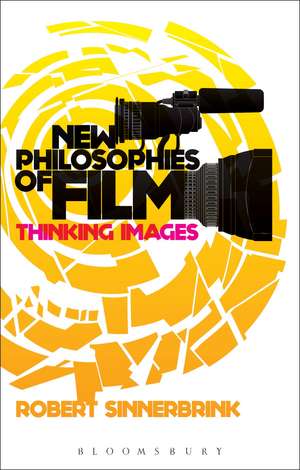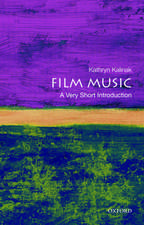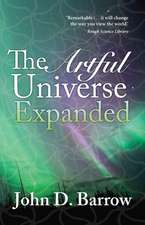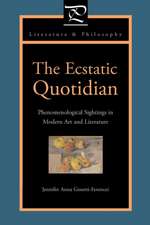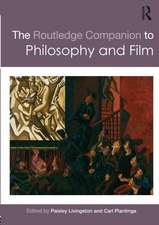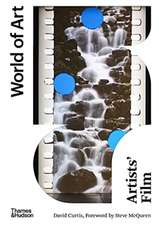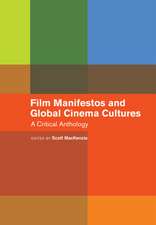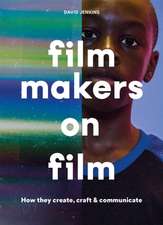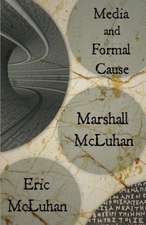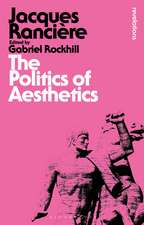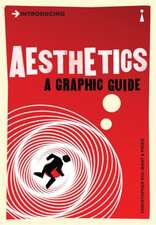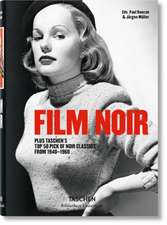New Philosophies of Film: Thinking Images
Autor Dr Robert Sinnerbrinken Limba Engleză Paperback – 12 oct 2011
| Toate formatele și edițiile | Preț | Express |
|---|---|---|
| Paperback (2) | 153.02 lei 3-5 săpt. | +55.31 lei 7-13 zile |
| Bloomsbury Publishing – 24 aug 2022 | 153.02 lei 3-5 săpt. | +55.31 lei 7-13 zile |
| Bloomsbury Publishing – 12 oct 2011 | 217.27 lei 6-8 săpt. | |
| Hardback (2) | 442.48 lei 6-8 săpt. | |
| Bloomsbury Publishing – 24 aug 2022 | 442.48 lei 6-8 săpt. | |
| Bloomsbury Publishing – 12 oct 2011 | 713.29 lei 6-8 săpt. |
Preț: 217.27 lei
Preț vechi: 244.55 lei
-11% Nou
Puncte Express: 326
Preț estimativ în valută:
41.58€ • 43.50$ • 34.54£
41.58€ • 43.50$ • 34.54£
Carte tipărită la comandă
Livrare economică 02-16 aprilie
Preluare comenzi: 021 569.72.76
Specificații
ISBN-13: 9781441153432
ISBN-10: 1441153438
Pagini: 264
Dimensiuni: 138 x 216 x 15 mm
Greutate: 0.33 kg
Editura: Bloomsbury Publishing
Colecția Continuum
Locul publicării:London, United Kingdom
ISBN-10: 1441153438
Pagini: 264
Dimensiuni: 138 x 216 x 15 mm
Greutate: 0.33 kg
Editura: Bloomsbury Publishing
Colecția Continuum
Locul publicării:London, United Kingdom
Caracteristici
An introductory survey of the full range of analytic and continental philosophical approaches to film.
Notă biografică
Robert Sinnerbrink is Senior Lecturer in Philosophy at Macquarie University, Australia. He is the author of Understanding Hegelianism (Acumen, 2007), co-editor of Critique Today (Brill, 2006), and has published articles on Lynch, Malick, and von Trier in journals including Film-Philosophy, Projections: The Journal of Movies and Mind, and Screening the Past.
Cuprins
Preface \ Introduction: Why Did Philosophy Go To The Movies? \ Part I: The Analytic-Cognitivist Turn \ 1. The Empire Strikes Back: Critiques of "Grand Theory" \ 2. The Rules of the Game: New Ontologies of Film \ 3. Adaptation: Philosophical Approaches to Narrative \ Part II: From Cognitivism to Film Philosophy \ 4. Cognitivism Goes to the Movies \ 5. Bande à part: Deleuze and Cavell as Film-Philosophers \ 6. Scenes from a Marriage: Film as Philosophy \ Part III: Cinematic Thinking \ 7. Hollywood in Trouble: David Lynch's INLAND EMPIRE \ 8. 'Chaos Reigns': Anti-cognitivism in Lars von Trier's Antichrist \ 9. Song of the Earth: Cinematic Romanticism inMalick's The New World \ Coda: 'The Six Most Beautiful Minutes in the History of Cinema'\ Bibliography \ Filmography \ Index.
Recenzii
Both an excellent introduction and an original contribution to the field, New Philosophies of Film: Thinking Images covers a large range of theoretical positions with impressive adroitness. By offering incisive philosophical analyses alongside brilliant film readings, Sinnerbrink achieves that rare thing, a true marriage of the abstract and the concrete that will be of huge value to scholars and students alike. Professor John Mullarkey, Kingston University, London, UK
Robert Sinnerbrink's New Philosophies of Film is a captivating, challenging, smart, and highly readable exploration of the aesthetic encounter between cinema and philosophy. As an introduction to the recent philosophical turn in film studies, the book offers a rich and insightful critical perspective on many influential developments in film theory such as cognitivism. As a contribution to the emerging field of philosophical engagement with film New Philosophies of Film shows that films can do more than just illustrate or serve as metaphors for philosophical ideas. Films are philosophically valuable in themselves insofar as they can engage in philosophizing as 'thinking agents'. Furthermore, films can invite us to invest in them philosophically, to meet them in dialogue as philosophical discussion partners. This idea comes alive in Sinnerbrink's exceptionally vivid examples, in which he analyzes the philosophical-aesthetic receptivity to the work of such filmmakers such as David Lynch, Lars von Trier and Terrence Malick. This book is a 'must read' not only for philosophers and film scholars, but also for anyone seriously enthusiastic about cinema. Tarja Laine, Assistant Professor, University of Amsterdam, The Netherlands.
New Philosophies of Film is an ambitious attempt to overcome the Analytic-Continental divide in theorizing about film and to develop a new understanding of the relationship between film and philosophy. Beginning with a critical overview of recent developments in the philosophy of film and ending with interpretations that present film as a new mode of thinking, this book breaks new ground and will have to be reckoned with by anyone interested in film and philosophy. Thomas E Wartenberg, Professor of Philosophy, Mount Holyoke College, Massachusetts, USA.
A valuable book for advanced students and scholars in film studies/film theory, and for philosophers concerned with the art of film.
A body of philosophical work has begun to accumulate around the provocation of cinema. Sinnerbrink enters the fray as a critical narrator of the history of this burgeoning philosophical enterprise as well as a participant in it and, in my judgment, makes an important contribution on both accounts.
Sinnerbrink's book will add a dose of welcome scepticism to anyone embarking on the consideration of some recent developments in anglophone film studies... Sinnerbrink injects life into his consideration of the cognitivists by means of adroit illustration from examples of his own choosing which display a cinephile's reservoir of resources - not always something that can be said of commentators content to use the same filmic examples as do their sources. This aspect is one of the many pleasures of Sinnerbrink's addition to the growing body of work in this field.
Robert Sinnerbrink's New Philosophies of Film is a captivating, challenging, smart, and highly readable exploration of the aesthetic encounter between cinema and philosophy. As an introduction to the recent philosophical turn in film studies, the book offers a rich and insightful critical perspective on many influential developments in film theory such as cognitivism. As a contribution to the emerging field of philosophical engagement with film New Philosophies of Film shows that films can do more than just illustrate or serve as metaphors for philosophical ideas. Films are philosophically valuable in themselves insofar as they can engage in philosophizing as 'thinking agents'. Furthermore, films can invite us to invest in them philosophically, to meet them in dialogue as philosophical discussion partners. This idea comes alive in Sinnerbrink's exceptionally vivid examples, in which he analyzes the philosophical-aesthetic receptivity to the work of such filmmakers such as David Lynch, Lars von Trier and Terrence Malick. This book is a 'must read' not only for philosophers and film scholars, but also for anyone seriously enthusiastic about cinema. Tarja Laine, Assistant Professor, University of Amsterdam, The Netherlands.
New Philosophies of Film is an ambitious attempt to overcome the Analytic-Continental divide in theorizing about film and to develop a new understanding of the relationship between film and philosophy. Beginning with a critical overview of recent developments in the philosophy of film and ending with interpretations that present film as a new mode of thinking, this book breaks new ground and will have to be reckoned with by anyone interested in film and philosophy. Thomas E Wartenberg, Professor of Philosophy, Mount Holyoke College, Massachusetts, USA.
A valuable book for advanced students and scholars in film studies/film theory, and for philosophers concerned with the art of film.
A body of philosophical work has begun to accumulate around the provocation of cinema. Sinnerbrink enters the fray as a critical narrator of the history of this burgeoning philosophical enterprise as well as a participant in it and, in my judgment, makes an important contribution on both accounts.
Sinnerbrink's book will add a dose of welcome scepticism to anyone embarking on the consideration of some recent developments in anglophone film studies... Sinnerbrink injects life into his consideration of the cognitivists by means of adroit illustration from examples of his own choosing which display a cinephile's reservoir of resources - not always something that can be said of commentators content to use the same filmic examples as do their sources. This aspect is one of the many pleasures of Sinnerbrink's addition to the growing body of work in this field.
